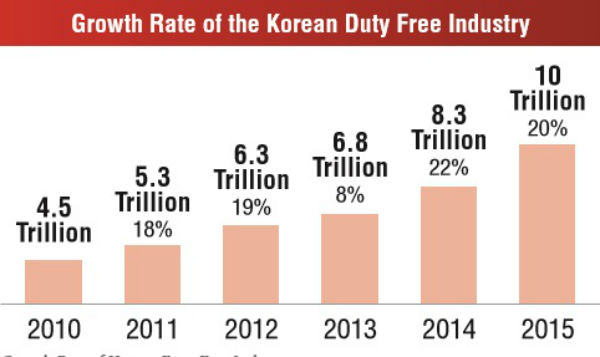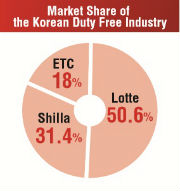The duty free business in Korea accounts for 10.5 percent of the global duty free business and is ranked as the largest scale in the world. This is because Korea has several factors that are advantageous to duty free corporations. Although Korean duty free corporations have favorable elements to increase their profit, there are still many concerns and skeptical views that the duty free industry is not stable enough. There are also many negative public opinions that the Korean government is intentionally giving corporations privileges to expand the stable condition for the duty free industry. The Sungkyun Times (SKT) introduces the scale and impact of the Korean duty free industry and its characteristics. In addition, this article will examine the recent controversies.
Present Condition of Korea’s Duty Free Industry

Products that are sold in duty free business corporations are not supposed to be assigned tariffs. Therefore, the price of products is relatively cheaper than that of other products that are sold in general corporations. The duty free industry, therefore, adds some interest rates that are lower than tax rates and attracts many (사진 1- news.zum.com) consumers by offering a cheaper price. Although a tax is not imposed on the products, the corporation should pay a certain amount of tax that is related to the profit it makes. Specifically, in Korea, as the duty free industry has to get patent rights from the government to start up the business, the tax that these corporations have to pay is called a patent commission.
The Korean duty free industry does not have a long history, and it developed through three main historical points, which are the 1988 Seoul Olympics, the 2002 World Cup, and the growth of Incheon International Airport. Through these events, the importance of the duty free industry has grown. Currently, the number of duty free stores in Korea is 49, and this is the largest number ever in the history of Korea’s duty free industry. Among these stores, the number of duty free stores downtown is 21, and this accounts for the largest part of the duty free industry. This significant number suggests that the duty free stores downtown are the most profitable and the most competitive type of store to get patent rights. Although duty free stores guarantee high profits, their numbers keep increasing, and this makes companies worry about the inability to maintain the same level of profit as before. Therefore, big duty free corporations, such as Lotte and Shilla, are attempting to broaden their business overseas. They share the stakes that they have with local corporations abroad and make duty free stores that fit the needs of that area. For example, Lotte Duty Free Corporation made a duty free store that targets Japanese customers at a hot spot in Tokyo.
Controversies in the Korean Duty Free Industry
Although Korean duty free corporations are progressing, there have been many controversies surrounding this industry.
• Privileges of Chaebol Corporations

The most controversial issue is the privileges of Chaebol companies. Chaebol is a Korean term that refers to the large and usually family-owned business groups in Korea, such as Samsung, Hyundai, and others. They make up a huge portion of the Korean economy, but always have been suspected of having privileges regarding taxes and other policies related to their business expansion. This suspicion applies to the duty free business as well. To start up the duty free business, corporations need to get patent rights from the government, and a prerequisite of this patent right is 1 billion of starting capital. As preparing such a large amount of starting capital is much easier for large corporations, people think that the basic condition for getting the patent right is suited to the Chaebol corporations that already have enough capital to start up the business. Moreover, the public sentiment is supported by the circumstance that 80 percent of the duty free business market share is dominated by large corporations such as Shilla and Lotte. The statistic shows that the duty free business is operated in a monopolistic manner.
People also have negative views regarding the tax rate imposed on duty free companies. The government imposes 0.05 percent of the patent commission as a tax on duty free companies. As 80 percent of the duty free business market is occupied by Chaebol corporations, the 0.05 percent of tax rate can be interpreted as the tax rate imposed to these corporations. In 2012, the Lotte duty free business gained a profit of 1 trillion, but the company was criticized for only paying 900,000 as the patent commission tax. As the example demonstrates, the government imposes an excessively low tax rate on duty free companies, and it has tried to maintain the tax rate no matter how fierce the criticism toward the low tax rate has been. In addition, duty free companies keep giving large amounts of rebates to travel agencies in order to get a comparatively more advantageous condition than other competitors. As lobbying also costs a considerable amount of money, the Chaebol companies receive many advantages from rebates. The impact of the financial power and the government policies that help Chaebol corporations to augment their profits has created a high barrier for the small- and medium-sized duty free business companies.
• Limitation of Expiration Law
Another controversial issue is the Law of Five-Year Expiration. In 2013, a law that obliges duty free business companies to be reexamined every five years was enacted. The initial purpose of this bill was to heighten the competence of the industry and increase the entry of small enterprises by reducing the influence of the Chaebol corporations. The reality, however, did not reflect the original purpose and instead resulted in the continuous monopoly by big corporations, with the main patent rights simply moving from Lotte and SK corporations to Doosan and Shinsegae. Also, as the period that the business can operate the company was reduced from ten years to five years, the investment sharply contracted due to concerns that the rights would expire and the investment would not gain proper return after the five-year reexamination. Thus, the loss of the initial purpose increases the demand for the revision of the Five-Year Expiration Law. As an alternative, the government enacted a revised bill in March of 2016. The main points of the revised law are: a changed expiration period, a new tax rate to companies, and different criteria for reexamination of patent rights. The points are expected to change the contracted investment condition and impose more patent commission taxes on the Chaebol corporations.
• Dependence on Chinese Tourists
The other controversial issue is excessive dependence on Chinese tourists. In 2015, six million Chinese tourists visited Korea, and this number accounts for more than 40 percent of foreign visitors to Korea. The huge number of visitors affected a large part of the Korean tourism industry as well as the duty free business. Each Chinese visitor spends an average of $2200, which is two times more than visitors from other countries. Thus, according to data from the Korean Customary Service Center, the consumption by Chinese visitors takes 57 percent of the overall turnover of the Korean duty free industry. This large share of Chinese visitors has even changed the high ranked products of the duty free industry from high priced luxury brands to relatively cheap but popular Korean cosmetics.
Although the significant amount of consumption by Chinese visitors in Korean duty free stores certainly helps the Korean duty free industry prosper, people worry about the impact of decreasing Chinese visitors to Korea. From 2014 to 2015, the infectious disease Middle East Respiratory Syndrome (MERS) was prevalent in Korea, and the number of tourists diminished sharply. As a result, the growth rate of duty free corporations, which had constantly maintained a rate of 23 percent, diminished to 10 percent. This figure proves that the influence of Chinese visitors is much greater than the former expectation. Also, as the Chinese government worries about its domestic market, it makes a diversion from the Korean duty free corporations that gain large amounts of profit from Chinese visitors. Therefore, the Chinese government enacted a domestic market conservation policy and encouraged people to spend money within the nation. Not only did the Chinese government enact such a policy, but it also promoted China’s national duty free stores to prevent the leakage of domestic wealth. The movement has influenced Korea’s duty free industry, and the market value of the main duty free corporations, such as Shisegae, has declined by half compared to the previous year. Thus, the uncertainty and the instability regarding this business keeps expanding.
Possible Improvements
Many controversies regarding Korea’s duty free industry still exist, and they are difficult to resolve. Nevertheless, there are some desirable directions that Korea’s duty free industry should follow.
Recently, many complaints have been reported, and about 30 percent of complaints were about the shopping experience. The complaints were about overcharging and low service quality. Although these are commonly reported complaints, not resolving them can lead to a continuous decline in the duty free and shopping industry. Thus, duty free corporations should improve the service quality to attract more visitors.
High dependence on Chinese visitors has a positive effect in good situations, but it brings negative impacts when the tourism conditions are bad. Therefore, the Korean duty free business should expand the range of the business and seek ways to diversify the market. Just like Lotte and Shinsegae duty free companies, other duty free corporations should expand the range of markets abroad and try to stabilize their profits while reducing their risk.
Finally, the government should keep making efforts to reduce the privileges of Chaebol. Although the recently revised bill aims to minimize the privileges of Chaebol, there are still many rebates and other lobbying practices that prevail in the duty free industry. The government should also reduce the inclination of giving advantageous positions to Chaebol companies and make attempts to eradicate these negative social customs.
From the beginning of the duty free business, it was always referred to as a so-called “jackpot business” because the government has given many privileges to duty free business corporations. Some would state that this has bolstered the Korean industry to one of the top duty free industries in the global market. However, there are some chronic problems that deter the growth of Korean duty free corporations. To attain further development, Korean duty free businesses and the government should make refinements to enhance the situation of the duty free industry in Korea.
